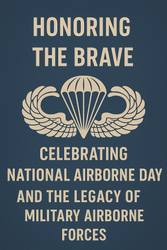Honoring the Brave: Celebrating National Airborne Day and the Legacy of Military Airborne Forces
Posted by Amer Hatoum on Aug 14th 2024
Celebrating National Airborne Day and the Legacy of Military Airborne Forces
Introduction to National Airborne Day
August 16th holds a special place in the hearts of many Americans as National Airborne Day. This day is dedicated to honoring the courage and contributions of the U.S. military’s airborne forces. Established by a Presidential Proclamation in 2001, National Airborne Day serves as a reminder of the bravery and sacrifice of those who have served as paratroopers, risking their lives by jumping into the unknown to secure critical victories for their country.
The Birth of Military Airborne Operations
The concept of airborne operations was born out of necessity during World War II. As military leaders sought new ways to outmaneuver enemy forces, they recognized the potential of deploying troops rapidly behind enemy lines. The U.S. Army’s first airborne units were established in 1940, with the goal of creating highly trained soldiers capable of parachuting into hostile territory. Among the pioneers of airborne warfare were the 82nd and 101st Airborne Divisions, whose names would soon become synonymous with courage and resilience.
Airborne Operations in Key Military Campaigns
Airborne troops played a pivotal role in some of the most significant military campaigns of World War II. Perhaps the most famous of these was the Normandy Invasion on D-Day, June 6, 1944. The 82nd and 101st Airborne Divisions were instrumental in the success of this operation, parachuting behind enemy lines to secure key objectives and pave the way for the Allied invasion. Their actions on D-Day exemplified the strategic importance of airborne forces in modern warfare.
Another notable airborne operation was Operation Market Garden, an ambitious plan to secure key bridges in the Netherlands and bring a swift end to the war. Although the operation ultimately fell short of its goals, the bravery and determination of the airborne troops were undeniable. Similarly, during the Battle of the Bulge, airborne forces played a critical role in the defense of Bastogne, holding the line against overwhelming odds and contributing to the eventual Allied victory.
The Evolution of Airborne Forces Post-WWII
Following World War II, airborne forces continued to prove their worth in conflicts around the world. During the Korean War, airborne tactics were adapted to meet the challenges of a new type of warfare, and in Vietnam, helicopter-borne operations became a hallmark of the conflict. The flexibility and adaptability of airborne forces made them a valuable asset in these and other conflicts.
In more recent years, airborne troops have been deployed in a variety of operations, including the Gulf War, Afghanistan, and Iraq. Advances in technology have allowed airborne forces to operate with even greater precision and effectiveness, ensuring that they remain a crucial component of the U.S. military’s strategy.
Why We Celebrate Airborne Day
National Airborne Day is more than just a date on the calendar; it’s a day to honor the spirit of the airborne forces. These soldiers embody qualities that are essential to military success: courage, adaptability, and tenacity. Their stories of heroism and unit cohesion are a testament to the unique bond that forms among those who serve in airborne units. This day also serves as a reminder of the significant impact that airborne operations have had on military history, shaping the way wars are fought and won.
Conclusion: Reflecting on the Airborne Legacy
As we celebrate National Airborne Day, it is important to remember and respect the sacrifices made by those who have served in airborne units. Their legacy continues to inspire new generations of soldiers, and their contributions to our nation’s security are immeasurable. Whether by supporting military organizations, visiting memorials, or participating in Airborne Day events, we can all play a part in honoring these brave men and women. The airborne spirit lives on, a powerful reminder of what can be achieved through courage, determination, and a willingness to leap into the unknown.
